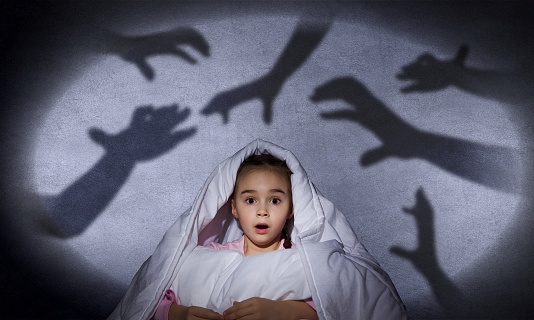Help! My child is having nightmares!
April 16th, 2021
1254 Views

Nightmares can occur in children of any age but 40% of children aged 3-7 years will experience nightmares frequently (as often as one a week) and 20% of children in the age group 7-12 years will continue to be troubled by them. It is very uncommon for toddlers to experience nightmares, Thankfully, most children do outgrow nightmares, but how can you help when your child is having nightmares?
More than anything else, your child needs reassurance that everything is fine and that they have had a nightmare. Give them a cuddle and plenty of reassurance in a quiet, soothing voice.. Do not suggest that they come and sleep in your bed or feel that you must stay with them until they fall asleep. Give them a favourite cuddly toy to comfort. Your child will still be tired and should return to sleep quickly
The next day when you are together at home, you can talk with your child about the nightmare. See how much of the nightmare they remember and importantly teach them what a nightmare is. If your child is bothered by the nightmare, help them to create a happy ending for it that they missed because they woke up!
When do nightmares usually occur?
In most younger children, nightmares usually occur in the early hours of the morning, when your child has had about 60% of their sleep. By this stage, they are in REM sleep (rapid eye movement). As its name suggests, in this phase of sleep, the eyes make many rapid movements and it is in this stage of sleep that most dreams occur. Nightmares affect both boys and girls and often, your child might not be fully woken by the nightmare.What happens when your child awakes?
Usually when a child wakes from a nightmare, they are unresponsive, but can be very anxious. Younger children’s nightmares usually follow a pattern and are about them being separated from their parents/carers or being chased by a monster or similar.More than anything else, your child needs reassurance that everything is fine and that they have had a nightmare. Give them a cuddle and plenty of reassurance in a quiet, soothing voice.. Do not suggest that they come and sleep in your bed or feel that you must stay with them until they fall asleep. Give them a favourite cuddly toy to comfort. Your child will still be tired and should return to sleep quickly
The next day when you are together at home, you can talk with your child about the nightmare. See how much of the nightmare they remember and importantly teach them what a nightmare is. If your child is bothered by the nightmare, help them to create a happy ending for it that they missed because they woke up!

Is there anything I can do to help prevent nightmares?
It will not be possible to stop all nightmares, but you can certainly help minimise their occurrence, by following these simple four steps-● Get into a good bedtime routine. Try and get your child to bed at the same time every night and to get up at the same time each morning. Lower the tempo 60 minutes before bedtime and introduce a relaxing routine of bath time followed by a bedtime story (nothing frightening).
● Give your child a much-loved soft toy to be their bed companion (‘bed buddy’) and to protect them from nightmares. Children do find cuddling a soft toy reassuring.
● If your child doesn’t like the dark, invest in a plug-in night light for their bedroom.
● If your child feels isolated in their bedroom, leave the door ajar so that they can hear noise from downstairs.
If your child is slightly older, electronics such as mobile phones and tablets, will inhibit the production of the sleep-inducing hormone melatonin and should be turned off at least 30 minutes before bedtime.
Whilst most children grow out of nightmares and most are not deeply bothered by them, some children become very anxious about having nightmares and actually try to avoid going to bed. If this happens, give your child plenty of positive reassurance and to encourage them to go to bed introduce a reward system.

When to seek medical help
Nightmares can be caused by over tiredness and also stressful situations such as moving house or school and the nightmares become less and less frequent. If however, you find that your child is having two or more nightmares a week and this has been going on for six months or more, it is best to see your doctor. Can you link the nightmares to a particular traumatic event? Are the nightmares getting worse or starting to impact daytime activities – if you answer ‘yes’ to any of these, it is worth getting advice from your doctor.Chrissie x

